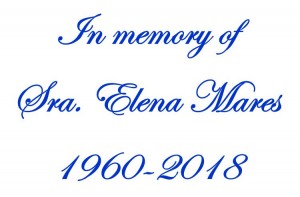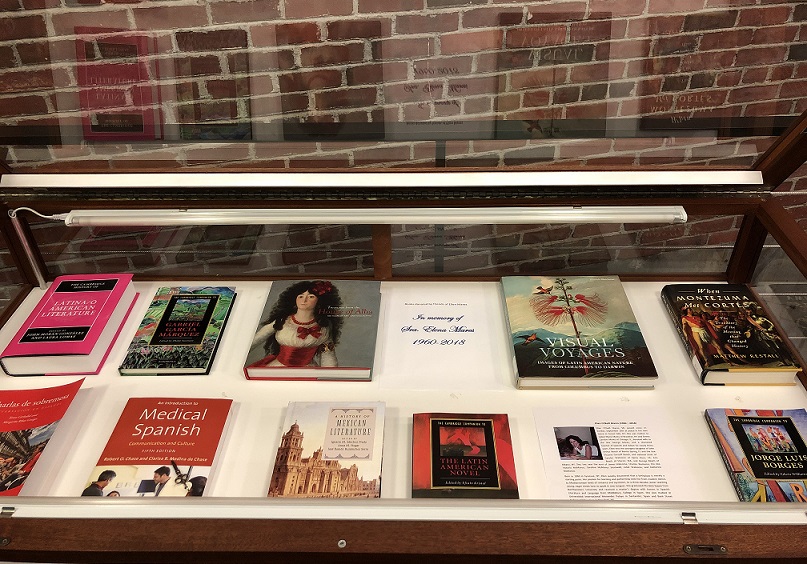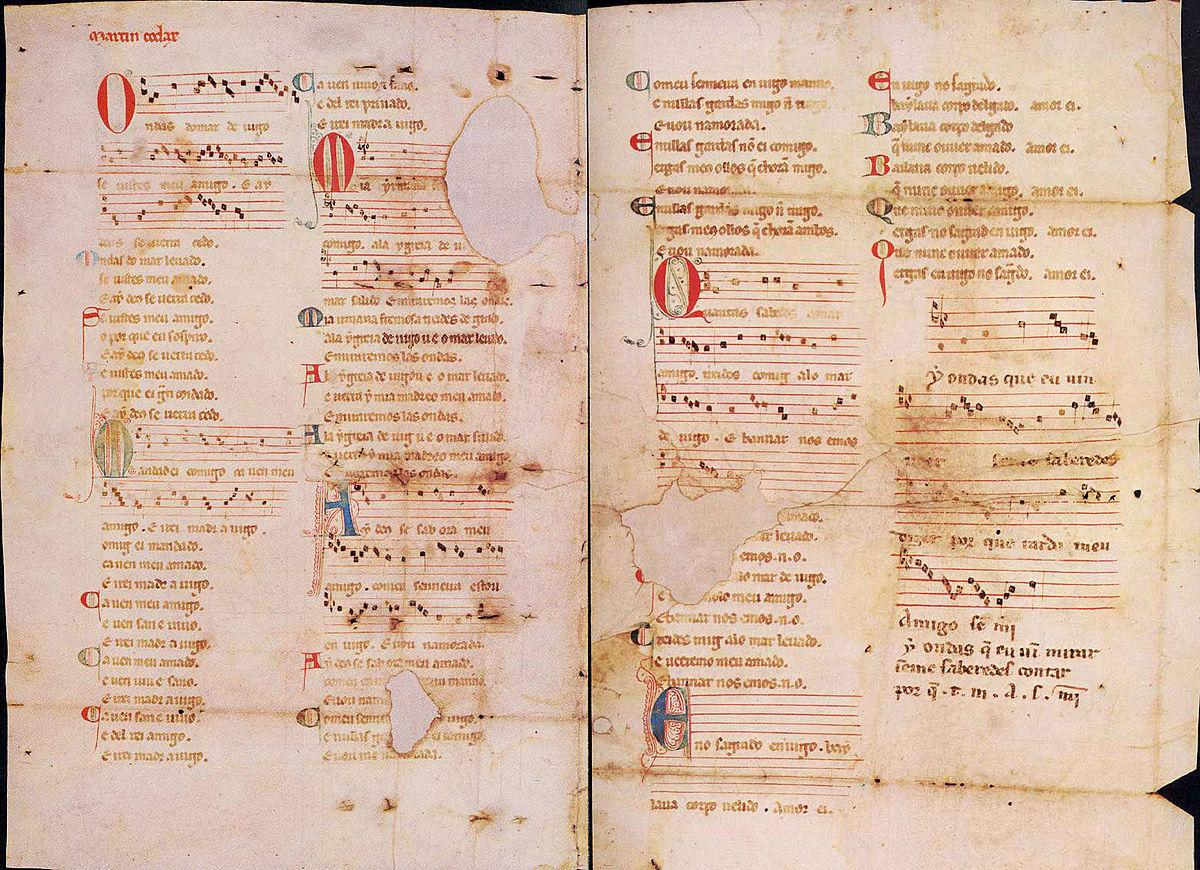Donaciòn «in memorian» de la Sra. Elena Mares.
La biblioteca del Instituto Cervantes ha recibido de parte de los amigos de Mrs. Ellen Mares una donación de libros en su memoria.
«Nacida en Syracuse, Nueva York, en 1960, Ellen descubrió rápidamente que un lugar de nacimiento es simplemente un punto de partida. Su pasión por aprender y actuar la llevó desde la danza moderna, a las tierras mediterráneas del romance y el misticismo, a una carrera de tres décadas que enseña a mentes jóvenes y entusiastas a hablar en nuevas lenguas. Se graduó en Phi Beta Kappa de la Northwestern University y recibió una maestría con honores en Literatura y Lengua en Español del Middlebury College en España. También estudió en la Universidad Internacional Menéndez Pelayo en Santander, España y en Bank Street College of Education en Nueva York, NY.
Ellen pasó su vida erudita y amante de los muchos idiomas del mundo. Soñó y habló en español, italiano, rumano e inglés, y también entendió los idiomas universales de la danza, el teatro y el arte. Ella compartió este ardor con su familia, amigos y estudiantes. Ellen entendió que la enseñanza del idioma era mucho más profunda que el vocabulario y la gramática. A lo largo de los años, docenas de sus alumnos le expresaron cómo los abrió a historias y experiencias y otros mundos.»
Extracto del artículo publicado en NYTimes.com Sept. 19 to Sept. 20, 2018

«Born in 1960 in Syracuse, NY, Ellen quickly discovered that a birthplace is merely a starting point. Her passion for learning and performing took her from modern dance, to Mediterranean lands of romance and mysticism, to a three-decade career teaching young, eager minds how to speak in new tongues. She graduated Phi Beta Kappa from Northwestern University and received a master’s degree with honors in Spanish Literature and Language from Middlebury College in Spain. She also studied at Universidad Internacional Menendez Pelayo in Santander, Spain and Bank Street College of Education in New York, NY.
Ellen spent her life a scholar and lover of the many languages of the world. She dreamt and spoke in Spanish, Italian, Romanian, and English, as well as understood the universal languages of dance, drama, and art. She shared this ardor with her family, friends, and students. Ellen understood that teaching language was far deeper than vocabulary and grammar. Over the years, dozens of her students expressed to her how she opened them up to stories and experiences and other worlds.»
Extracted from the obituary published on NYTimes.com from Sept. 19 to Sept. 20, 2018
El «Pergamino Vindel», en la Biblioteca del Instituto Cervantes de Nueva York.
La biblioteca Jorge Luis Borges del Instituto Cervantes de Nueva York enriquece sus fondos con la edición casi-original del Pergamino Vindel publicada por M. Moleiro Editor. El pergamino –que contiene siete cantigas de amigo, lo que hoy llamaríamos canciones de amor, del enigmático trovador del s. XIII Martin Codax y cuyo original constituye un tesoro singular de las letras gallegas y patrimonio universal de la cultura española– es propiedad de la Morgan Library & Museum de Nueva York. A través de la donación de este casi-original, el pergamino queda a disposición de un amplio número de personas.
La donación se produce con motivo del Vindel que sale por primera vez de la Morgan Library para ser expuesto en el Museo del Mar de Galicia, en Vigo, hasta el 4 de marzo de 2018.
Los interesados tendrán a su alcance en nuestra biblioteca, junto al casi-original de la obra, el estudio monográfico en edición trilingüe castellano-gallego-inglés, ilustrado en color, realizado por especialistas tan reputados como Mariña Arbor, de la Universidad de Santiago, coordinadora del estudio; Antonio Calvia, de la Fondazione Ezio Franceschini (Florencia); Antonio Ciaralli, de la Università degli Studi di Perugia; Rip Cohen, de la Johns Hopkins University (Baltimore) y Simone Marcenaro, de la Università degli Studi di Milano. El prefacio es obra del medievalista Harvey L. Sharrer, profesor emérito de la Universidad de California en Santa Bárbara. La edición incluye un CD en el que la soprano Speranza Cerullo interpreta las Cantigas de Martin Codax tal y como se compusieron.
El pergamino, escrito en el último cuarto del s. XIII, fue descubierto a principios del s. XX por el librero y bibliófilo Pedro Vindel en las guardas de un ejemplar del ciceroniano De officiis (Sobre los deberes, o De oficios): una pieza de 452 x 336 mm que hoy sabemos fue elaborada a diez manos en cuatro columnas. “Dos copistas escribieron las letras de las cantigas, dos rubricadores pusieron las mayúsculas, coloreadas, y trazaron los pentagramas. Luego, un músico reprodujo las notas musicales”, revela la profesora Arbor. Vindel dio noticia de su hallazgo en 1914 en la revista Arte Español y, movido por su afán divulgador y consciente del valor del descubrimiento, ofreció un año después una edición facsímil.
Tras una azarosa peripecia, trufada con una temida desaparición, el tesoro documental fue subastado en 1977 en Londres, donde lo adquirió la Morgan Library neoyorquina, cuyo jefe de Manuscritos Medievales, Roger S. Wieck, subraya que “sólo hay dos textos de cantigas manuscritas del siglo XIII que han sobrevivido con su música”. El otro, el Pergamino Sharrer, descubierto en 1990 por el autor del prefacio de esta edición del Vindel ya disponible en la biblioteca del Instituto Cervantes de Nueva York, perdió prácticamente toda su notación musical en una catastrófica restauración, por lo que los investigadores sólo pueden trabajar sobre él a partir de fotografías anteriores. El Pergamino Vindel revolucionó “el mundo medieval, el mundo musical y el mundo de la poesía”, enfatiza Wieck.
Video: intervención de Roger S. Wieck, conservador de Manuscritos
Medievales del Morgan, del minuto 14:44 al 19:42.
The collections of the Jorge Luis Borges Library of the Instituto Cervantes in New York have been enriched by the donation of a deluxe facsimile edition of the manuscript known as the Pergamino Vindel published by M. Moleiro Editor. The parchment contains seven «cantigas de amigo», what today we would call songs of love, by the enigmatic 13th century troubadour Martin Codax. The original document, a unique treasure of the Galician letters and part of the universal patrimony of Spanish culture, is owned by the Morgan Library & Museum in New York and through this donation is available to a wider public.
The donation of the facsimile takes place at the same time as the first loan of this valuable manuscript. It travels with great security and under the supervision of a conservator of the Morgan Library to the Museum of the Sea of Galicia in the city of Vigo where it will be exhibited until March 4, 2018.
Those interested will have at their disposal in our library, along with the almost original of the work, the monographic study in trilingual Spanish-Galician-English edition, illustrated in color, made by specialists as reputed as Mariña Arbor, from the University of Santiago, coordinator of the study; Antonio Calvia, of the Fondazione Ezio Franceschini (Florence); Antonio Ciaralli, of the Università degli Studi di Perugia; Rip Cohen, from Johns Hopkins University (Baltimore) and Simone Marcenaro, from the Università degli Studi di Milano. The preface is the work of the medievalist Harvey L. Sharrer, professor emeritus of the University of California at Santa Barbara. The edition includes a CD in which the soprano Speranza Cerullo interprets the Cantigas de Martin Codax as they were composed.
The parchment, written in the last quarter of the 13th century, was discovered in the early 20th century by the bookseller and bibliophile Pedro Vindel in the binding of a copy of the Ciceronian Of officiis (On Duties or On Obligations): one piece, 452 x 336 mm, that we know today was elaborated by ten hands in four columns. «Two copyists wrote the lyrics of the cantigas, two initiators placed the capital letters, colored, and traced the pentagrams. Then a musician transcribed the musical notes,” says Professor Arbor. Vindel reported on his discovery in 1914 in the magazine Arte Español and, motivated by his zeal for dissemination and aware of the value of the discovery, offered a facsimile edition a year later.
The documentary treasure was auctioned in 1977 in London, where it was bought by the Morgan Library of New York. Roger S. Wieck, curator of Medieval Manuscripts, emphasizes that «there are only two texts of handwritten canticles of the 13th century that have survived with their music.” The other one, the Pergamino Sharrer, which was discovered in 1990 by the author of the preface to this edition, lost practically all its musical notation in a catastrophic restoration, and for that reason researchers can only work on it from previous photographs. This edition of the Vindel Parchment, which is now available in the library of the Instituto Cervantes of New York, revolutionized «the medieval world, the musical world and the world of poetry,» emphasizes Wieck.

